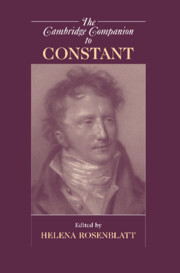Book contents
- Frontmatter
- Introduction
- 1 Benjamin Constant: Life and Work
- Part I The Political Thinker and Actor
- 2 Liberalism’s Lucid Illusion
- 3 The Liberty to Denounce: Ancient and Modern
- 4 Constant’s Idea of Modern Liberty
- 5 Benjamin Constant and the Terror
- 6 Constant’s Thought on Slavery and Empire
- 7 Benjamin Constant as a Second Restoration Politician
- Part II The Psychologist and Critic
- Part III The Analyst and Historian of Religion
- Conclusion
- 15 Eclipses and Revivals Constant’s: Reception in France and America 1830-2007
- Bibliography
- Index
- Series List
6 - Constant’s Thought on Slavery and Empire
from Part I - The Political Thinker and Actor
Published online by Cambridge University Press: 28 July 2009
- Frontmatter
- Introduction
- 1 Benjamin Constant: Life and Work
- Part I The Political Thinker and Actor
- 2 Liberalism’s Lucid Illusion
- 3 The Liberty to Denounce: Ancient and Modern
- 4 Constant’s Idea of Modern Liberty
- 5 Benjamin Constant and the Terror
- 6 Constant’s Thought on Slavery and Empire
- 7 Benjamin Constant as a Second Restoration Politician
- Part II The Psychologist and Critic
- Part III The Analyst and Historian of Religion
- Conclusion
- 15 Eclipses and Revivals Constant’s: Reception in France and America 1830-2007
- Bibliography
- Index
- Series List
Summary
Both Constant’s broadly theoretical works and his immediate political interventions indicate his perception that empire and slavery were urgent political problems of the post-revolutionary world. He published his eloquent denunciation of conquest, De l'esprit de conquête et de l'usurpation (Spirit of Conquest and Usurpation), during the dramatic months of Napoleon’s fall in early 1814, as his first published political statement since his falling out with the Emperor over a decade earlier. It is significant that the essay dwelt on foreign conquest - its injustices abroad and its debasement of political life at home - as the distinctive abomination of Napoleonic politics. Constant had little occasion in the remaining seventeen years of his life to discuss conquest and empire, for during the crisis-ridden Bourbon Restoration, France was not in a position to regain the territories lost over the years to the British, or to expand into new ones. The first major effort at colonial expansion, the conquest of Algiers in 1830, took place just a few months before Constant’s death. But the Spirit of Conquest identified with subtlety and prescience the social dynamics of a politics of conquest in a modern nation, and Constant’s critique identified in advance many of the political and rhetorical strategies the advocates of the Algerian conquest would use to sell that conquest to the French nation. During Constant’s years as a legislator, he regarded slavery and the slave trade as the most pressing problems presented by the French Empire.
- Type
- Chapter
- Information
- The Cambridge Companion to Constant , pp. 115 - 145Publisher: Cambridge University PressPrint publication year: 2009
- 3
- Cited by

